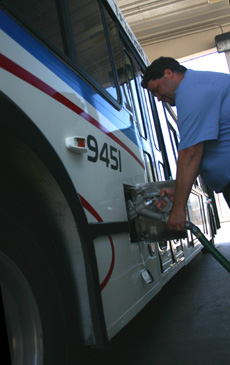High gas prices affect local businesses

Don Pittman, maintenance worker for the Champaign-Urbana Mass Transit District, fuels a bus Wednesday at the maintenance facility at 803 E. University Ave., Urbana. Director of Maintenance David Moore said that the MTD´s cost of diesel fuel has pro Online Poster
August 25, 2005
At almost $3 per gallon, gasoline prices are the highest ever. Full tanks of gas for a compact car cost nearly $45, causing many people to reconsider driving.
But as people, such as University students, turn to public transportation, the Champaign-Urbana bus and taxi companies have felt the impact of high gas prices.
Yellow Checker Cab Company is just one of the businesses that made several new acccomodations because of the increasing costs as they serve University students.
“We had to raise our (fare) prices when the cost of gas rose to $1.75 per gallon years ago,” said Redith Ewing, owner and manager of Yellow Checker Cab Company. “Now that prices have reached $2.69 per gallon, we’ve had to look for other options.”
Before the Yellow Checker Cab Company begins to increase taxi fares, the company wants to do everything else they can to ease the stress caused by the rising gas prices, Ewing said.
Get The Daily Illini in your inbox!
“We are taking every precaution possible to purchase new vehicles,” she said. “We are buying vehicles that get better gas mileage.”
The rising gas prices also have affected the company’s cab drivers, Ewing said.
“Our drivers actually pay for their own gas,” Ewing said. “They used to just have to pay $15 to fill up, but now they are paying up to $30 or $40 a tank.”
Champaign-Urbana’s Mass Transit District buses needed to find ways to deal with the increasing cost of diesel.
“Two years ago, the cost of diesel fuel ranged from 99 cents to $1.20 per gallon,” said Tom Costello, assistant managing director of CU-MTD. “The prices for diesel now continue to rise and rise.”
The prices for diesel are partially covered by fares the public has to pay, but as for University students, the fees for riding the buses have been added into tuition fees, Costello said.
“A referendum passed last spring stating that for the next three years, the University cannot raise student fees,” Costello said.
But he said the rising prices for diesel do affect the bus company.
“We just have to have an anticipation for fuel rising,” Costello said. “There is not much we can do internally.”
LEX Illini Express transports students from campus to the Chicago suburbs on weekends and major holidays. They also agreed that gas prices impacted their business.
“We must keep in mind that prices will keep being on the rise,” said Robert Frazier, president of LEX Illini Express. “Fuel prices are not done rising. This will affect us for years to come.”
Frazier said his company had to raise prices from $18 one-way at the end of last school year to $20 one-way at the beginning of this school year.
“Prices for fuel have spiked dramatically in the last four weeks,” Frazier said.
He also said that raising fare prices is not easy.
“We carry the burden from the oil companies,” Frazier said. “We have to hear the complaints from our customers. Unfortunately, we’ve been so complacent with the ever-changing gas prices.”
But Frazier said that despite the high prices for fuel, coach buses have the advantage of transporting many people at one time.
“The good thing about buses is that the price for one tank of gas can be shared by 40 to 50 people,” he said. “Students really aren’t saving money by driving their own cars home.”






